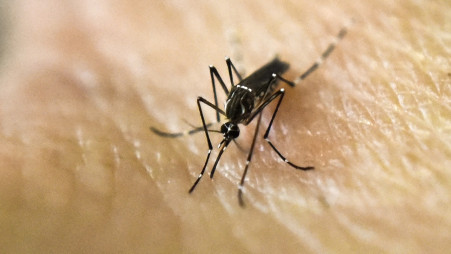Study finds out why some people are ‘mosquito magnets’

Scientists have known that the pests are drawn to people at varying rates, but they have struggled to explain what makes certain people "mosquito magnets" while others get off bite-free.
In a new paper published on 18 October in the journal Cell, researchers suggest that certain body odours are the deciding factor, reports Scientific American.
Every person has a unique scent profile made up of different chemical compounds, and the researchers found that mosquitoes were most drawn to people whose skin produces high levels of carboxylic acids.
Additionally, the researchers found that peoples' attractiveness to mosquitoes remained steady over time, regardless of changes in diet or grooming habits.
"The question of why some people are more attractive to mosquitoes than others—that's the question that everybody asks you," says study co-author Leslie Vosshall, a neurobiologist and mosquito expert at the Howard Hughes Medical Institute and the Rockefeller University.
That public interest is what drove Vosshall and her colleagues to design this study, she said.
Over time, researchers began to coalesce around the theory that body odour must be a primary culprit in mosquito attraction. But scientists have been unable to confirm which specific odours mosquitoes prefer.
To answer this question, Vosshall and her colleagues gathered 64 participants and had them wear nylon stockings on their arms. After six hours, the nylons were imbued with each person's unique smell.
"Those nylons would not have a smell to me or, I think, to anyone really," said Maria Elena De Obaldia, a senior scientist at the biotech company Kingdom Supercultures and lead author of this new study, which she conducted while at Rockefeller.
Still, the stockings were certainly odorous enough to entice mosquitoes.
The researchers cut the nylons into pieces and placed two (from different participants) into a closed container housing female Aedes aegypti mosquitoes.
Did they migrate to subject number one's sample en masse or prefer the scent of subject number two's? Or were both equally appealing? The researchers continued these head-to-head battles over several months, Vosshall says, collecting new samples from the participants as needed. When the tournament was over, the team had clear proof that some people were more attractive than others. Subject 33 had the dubious honour of being the biggest mosquito magnet; they had an attractiveness score "over 100 times greater" than that of the least attractive subjects, 19 and 28, the study authors wrote.
The researchers analysed the subjects' scent profiles to see what might account for this vast difference. They found a pattern: the most attractive subjects tended to produce greater levels of carboxylic acids from their skin while the least attractive subjects produced much less.
Carboxylic acids are commonplace organic compounds. Humans produce them in our sebum, which is the oily layer that coats our skin; there, the acids help to keep our skin moisturized and protected, Vosshall said.
Humans release carboxylic acids at much higher levels than most animals, De Obaldia added, though the amount varies from person to person.
"This property of being a mosquito magnet sticks with you for your whole life—which is either good news or bad news, depending on who you are," Vosshall says.
"This study confirms, in a very careful way, that it is true that some people are more attractive [to mosquitoes] than others," says Omar Akbari, a cell and molecular biologist at the University of California, San Diego, who was not involved with the study but whose recent work focuses on mosquitoes.
De Obaldia noted that Aedes aegypti mosquitoes evolved to prey specifically on humans thus, Aedes aegypti became extremely adept at differentiating the smell of humans from the smell of other animals.
Carboxylic acids are compounds that humans emit in spades, while other animals do not.



 Keep updated, follow The Business Standard's Google news channel
Keep updated, follow The Business Standard's Google news channel















